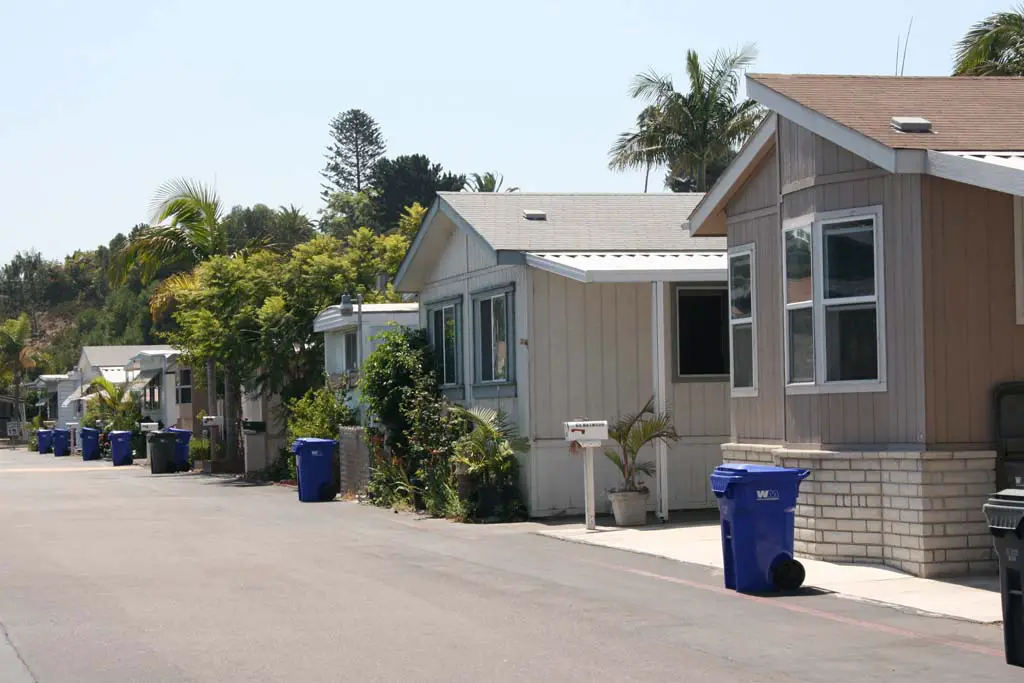VISTA — The property owner of Cavalier Mobile Estates is not allowed to subdivide and sell individual mobile home spaces.
The most recent court ruling in the ongoing four-year battle of Dunex Inc., the owner group of Cavalier Mobile Estates, versus the city of Oceanside sided with the city and appealed the prior court decision on Aug. 13.
This ruling is favorable for mobile home owners who live in the park under the city rent control ordinance and cannot afford to purchase the lot space they currently rent on a month-to-month basis.
The appeal was granted after a similar case involving a mobile home park owner requesting to subdivide and sell was held to the Coastal Act and Mello Act.
According to Oceanside city attorney John Mullen, Dunex Inc., which includes owner Brian Alex and approximately 40 small investors, failed to provide information on the project’s impact to the environment and low-income housing.
Mark Alpert, an attorney for Dunex Inc., said the information was not requested. Records from a previous trial court confirm this.
“The superior court and the city never asked us for information about low-income folks living in the park,” Alpert, with Hart, King & Coldren law firm, said. “That only applies when you’re going to be eliminating houses not when you are converting ownership to new owners.”
The arguable point is whether subdivision should be held to Mello Act.
Mullen said it is unknown how many of the spaces are occupied by low-income families.
If the property was subdivided and sold any housing that is determined to be moderate to low income must to be replaced by the property owner according to the Mello Act.
Mullen said Dunex deemed that subdividing and selling the spaces was not changing the property use and disregarded the Mello Act.
Mullen said requirements of the local coastal program to provide an Environmental Impact Report on the property, which is located in a flood zone, were also ignored by Dunex.
“He disagreed and refused to provide information,” Mullen said. “The California Superior Court ruled an identical case. You do have to apply the local coastal program.”
“Our motive was not to prevent the owner from pursuing the application. He’s got to give us all the information. He disagreed with that. He never determined what environmental impact the project caused and if it’s consistent with the local coastal program to city staff.”
The mobile home park, located on Oceanside Boulevard just west of the I-5 freeway, has 339 spaces, which mobile home owners rent to permanently park their mobile homes on.
Presently all Oceanside mobile home owners are protected under the city rent control ordinance that puts a ceiling on how much a park owner can charge for space rents.
Alpert said the rent amount for a mobile home space at the park is “obscenely low” for the area and rents at $300 to $350 a month.
He added that if the property were subdivided many of the mobile home owners would purchase the spaces.
His statement seems to contradict the survey that his law firm conducted that said 132 of 166 mobile home owners surveyed opposed the conversion.
“The survey gave a choice of continuing to pay rent at an obscenely low price or buying the lot at a fair market price,” Alpert said. “If the property was subdivided their decision would be much different — of course they would buy.”
Alpert said the property owner’s intention of subdividing the property is to sell the lots to existing renters and future buyers.
Homeowners who do not wish to purchase the lot space could continue to rent at a rate that would increase over four years to the rental rate determined by the Consumer Price Index. Low-income households would be charged a lower state controlled rent amount.
In other words the city rent control ordinance would no longer apply.
“Everyone has the right to keep renting,” Alpert said. “Low-income folks are strongly protected.”
A damages claim by Dunex against the city is pending and will be heard in September. It charges the city with taking the value of the property from the owner by forcing the owner to rent at rates dictated by the city rent control ordinance.
“The city has forced the client to continue renting spaces at less than a third of the fair market value,” Alpert said.
Dunex has filed four lawsuits against the city since 2009. In prior lawsuits Dunex requested mobile home owners pay state rent increase rates, charged the city with denying the state rent increase rates, and charged the city with denying a subdivision map.
“The courts ruled the owner is getting a fair return multiple times,” Mullen said. “The courts have ruled rent control constitutional. The council has it in place and we have to defend it.”
Another complication is the mobile home park is operating under a conditional use permit that has expired.



2 comments
Correct Ms Walshaw. The entire mobile home park situation boils down to greed, money and power. The idiots on city councils are greedy, the developers are about money, and the higher ups who fund this garbage are all about power and control. It is not hard to connect the dots, when you know what to look for. The reason these people want to eliminate Completely, the mobile home parks, is not just for the temporary $$ in construction, or developer money, or a few bucks in the pockets of city council members, it is to build the high density, sustainable development low income housing along the rail lines to herd the people into the cities..thereby it will be so easy to control them. NO private property, NO private transportation, which means cars..people! Wake the heck up. All inside the Wildlands Project and the UN Agenda 21. Been around for over 20 years. Why do you not know about it? The same reason you do not know the truth about this Oligarchy government that used to be a Constitutional Republic.. before the Civil War. Oh, and if you want to realize who and what Lincoln was.. read the truth. He should be dug up and shot again.
The only party getting rich off these frivolous lawsuits is Mr. Alpert and his firm, Hart, King & Coldren. Mr. Alpert knows full well that the majority of people who live in rent-controlled mobile home parks are seniors living on fixed incomes and low income families. How much is “fair market value” to PURCHASE a plot of land along the I-5 & Oceanside Blvd.? How much are the property taxes? There’s a BIG difference between a REAL park conversion to resident ownership and a “SHAM” conversion designed to do an “end-run” around Oceanside’s rent control protections for low income homeowners. These residents are not RENTING their homes – they OWN them. Alpert just told you that he considers current rents (for a parking spot) to be “one-third of fair market value.” Homeowners living on fixed incomes could not keep their homes if space rents TRIPLED! (Could YOU afford to keep your home if Prop. 13 was overturned?) For the money spent on this litigation, park owners could have complied with local and state laws to relocate the homeowners. Instead, they continue to drag these homeowners through years of uncertainty, along with the homeowners in other Oceanside parks represented by Mr. Alpert and his firm.
Comments are closed.